Management Styles, Communication, and Leadership Report Analysis
VerifiedAdded on 2020/07/22
|12
|2415
|46
Report
AI Summary
This report provides an in-depth analysis of various management styles, including autocratic, democratic, and laissez-faire approaches, along with their respective advantages and disadvantages. It explores key leadership characteristics such as integrity, communication skills, and creativity, and evaluates the communication processes within organizations, referencing examples from Thomas Cook. The report also examines organizational culture and change, and how these elements impact business operations. Furthermore, it assesses management skills performance, personal strengths, weaknesses, opportunities, and threats (SWOT analysis) of managers, and the importance of setting priorities and objectives. The report discusses team motivation, managerial decision-making, and how these support the achievement of organizational goals, including an overview of Maslow's hierarchy of needs. Finally, it covers managerial and personal skills that support career development, and the importance of planning for future needs.
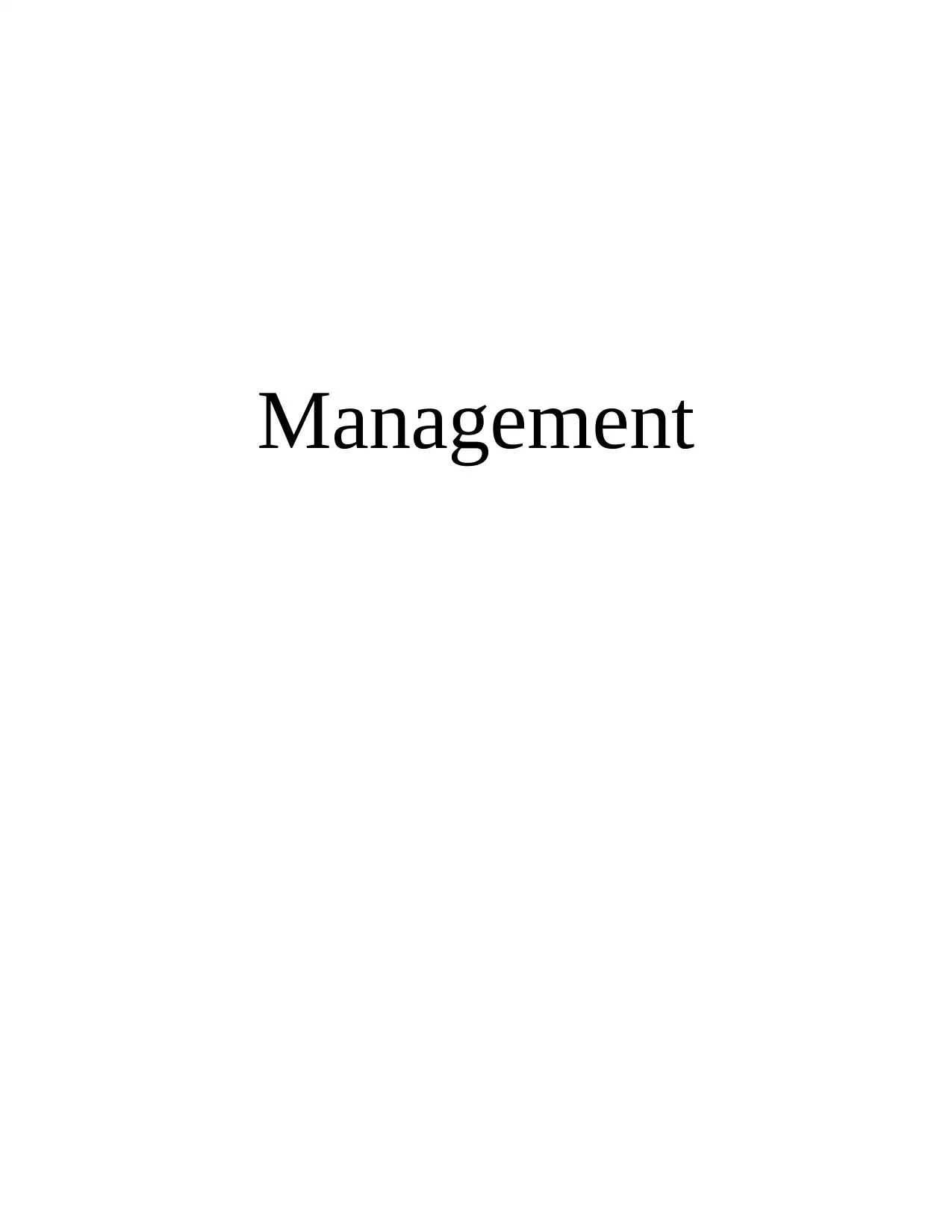
Management
Paraphrase This Document
Need a fresh take? Get an instant paraphrase of this document with our AI Paraphraser
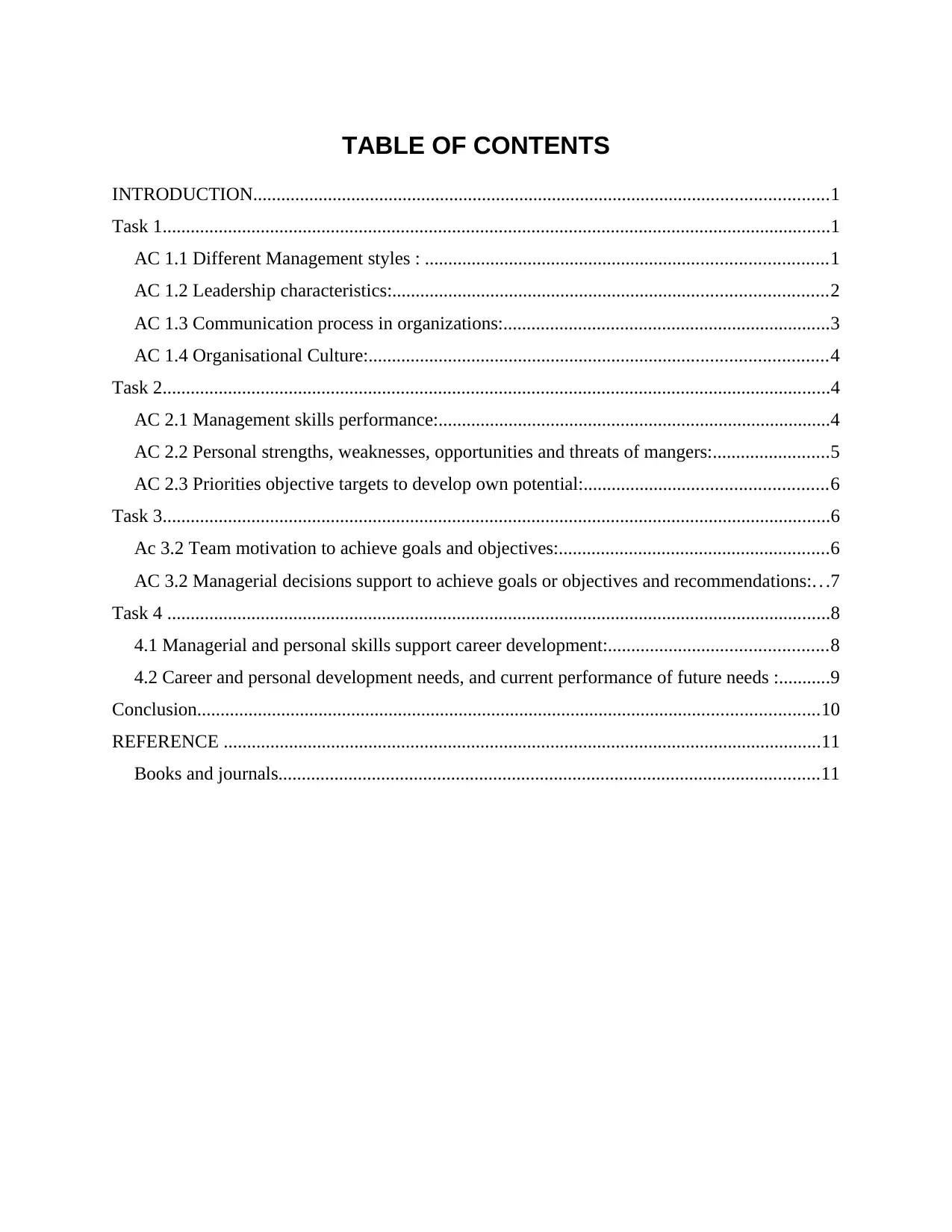
TABLE OF CONTENTS
INTRODUCTION...........................................................................................................................1
Task 1...............................................................................................................................................1
AC 1.1 Different Management styles : ......................................................................................1
AC 1.2 Leadership characteristics:.............................................................................................2
AC 1.3 Communication process in organizations:......................................................................3
AC 1.4 Organisational Culture:..................................................................................................4
Task 2...............................................................................................................................................4
AC 2.1 Management skills performance:....................................................................................4
AC 2.2 Personal strengths, weaknesses, opportunities and threats of mangers:.........................5
AC 2.3 Priorities objective targets to develop own potential:....................................................6
Task 3...............................................................................................................................................6
Ac 3.2 Team motivation to achieve goals and objectives:..........................................................6
AC 3.2 Managerial decisions support to achieve goals or objectives and recommendations:. . .7
Task 4 ..............................................................................................................................................8
4.1 Managerial and personal skills support career development:...............................................8
4.2 Career and personal development needs, and current performance of future needs :...........9
Conclusion.....................................................................................................................................10
REFERENCE ................................................................................................................................11
Books and journals....................................................................................................................11
INTRODUCTION...........................................................................................................................1
Task 1...............................................................................................................................................1
AC 1.1 Different Management styles : ......................................................................................1
AC 1.2 Leadership characteristics:.............................................................................................2
AC 1.3 Communication process in organizations:......................................................................3
AC 1.4 Organisational Culture:..................................................................................................4
Task 2...............................................................................................................................................4
AC 2.1 Management skills performance:....................................................................................4
AC 2.2 Personal strengths, weaknesses, opportunities and threats of mangers:.........................5
AC 2.3 Priorities objective targets to develop own potential:....................................................6
Task 3...............................................................................................................................................6
Ac 3.2 Team motivation to achieve goals and objectives:..........................................................6
AC 3.2 Managerial decisions support to achieve goals or objectives and recommendations:. . .7
Task 4 ..............................................................................................................................................8
4.1 Managerial and personal skills support career development:...............................................8
4.2 Career and personal development needs, and current performance of future needs :...........9
Conclusion.....................................................................................................................................10
REFERENCE ................................................................................................................................11
Books and journals....................................................................................................................11
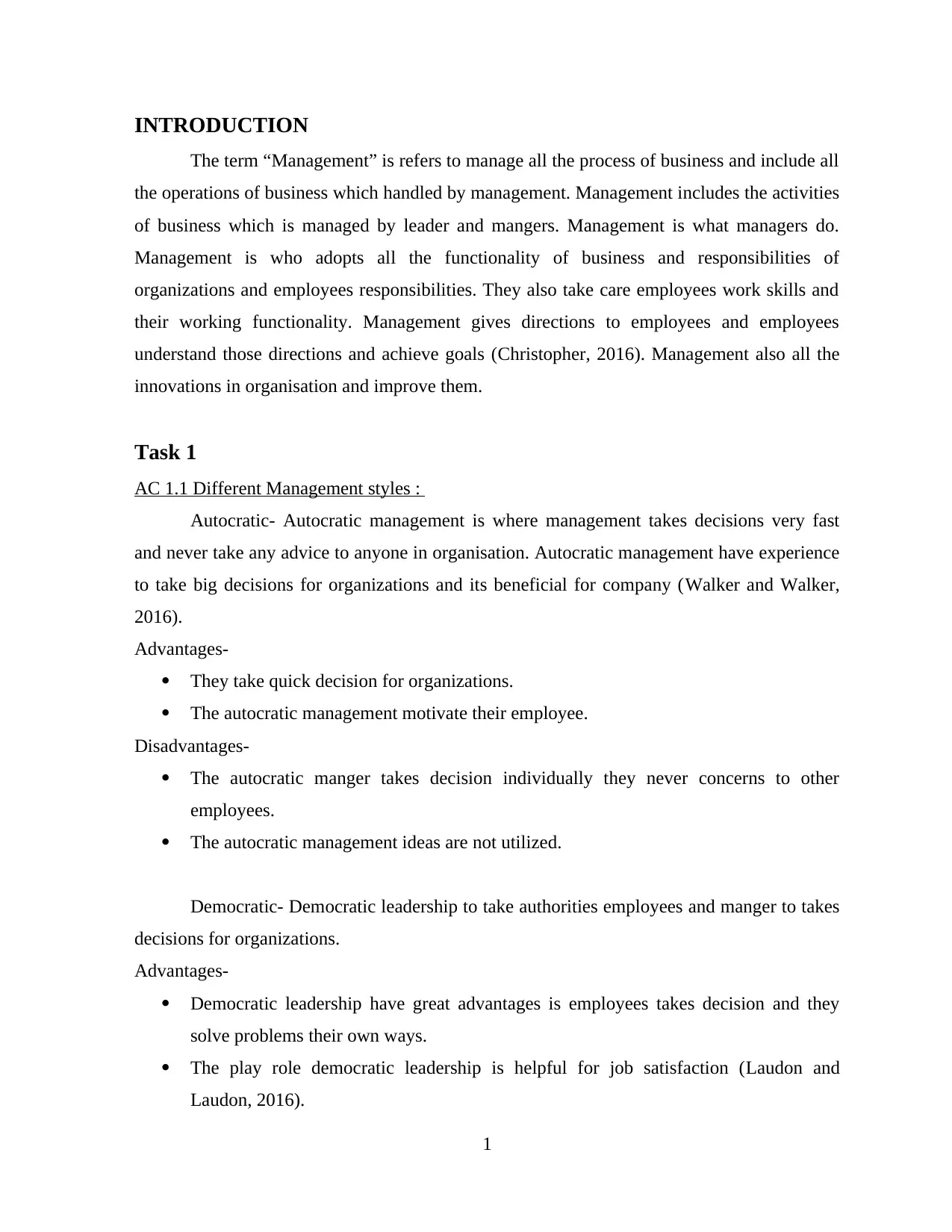
INTRODUCTION
The term “Management” is refers to manage all the process of business and include all
the operations of business which handled by management. Management includes the activities
of business which is managed by leader and mangers. Management is what managers do.
Management is who adopts all the functionality of business and responsibilities of
organizations and employees responsibilities. They also take care employees work skills and
their working functionality. Management gives directions to employees and employees
understand those directions and achieve goals (Christopher, 2016). Management also all the
innovations in organisation and improve them.
Task 1
AC 1.1 Different Management styles :
Autocratic- Autocratic management is where management takes decisions very fast
and never take any advice to anyone in organisation. Autocratic management have experience
to take big decisions for organizations and its beneficial for company (Walker and Walker,
2016).
Advantages-
They take quick decision for organizations.
The autocratic management motivate their employee.
Disadvantages-
The autocratic manger takes decision individually they never concerns to other
employees.
The autocratic management ideas are not utilized.
Democratic- Democratic leadership to take authorities employees and manger to takes
decisions for organizations.
Advantages-
Democratic leadership have great advantages is employees takes decision and they
solve problems their own ways.
The play role democratic leadership is helpful for job satisfaction (Laudon and
Laudon, 2016).
1
The term “Management” is refers to manage all the process of business and include all
the operations of business which handled by management. Management includes the activities
of business which is managed by leader and mangers. Management is what managers do.
Management is who adopts all the functionality of business and responsibilities of
organizations and employees responsibilities. They also take care employees work skills and
their working functionality. Management gives directions to employees and employees
understand those directions and achieve goals (Christopher, 2016). Management also all the
innovations in organisation and improve them.
Task 1
AC 1.1 Different Management styles :
Autocratic- Autocratic management is where management takes decisions very fast
and never take any advice to anyone in organisation. Autocratic management have experience
to take big decisions for organizations and its beneficial for company (Walker and Walker,
2016).
Advantages-
They take quick decision for organizations.
The autocratic management motivate their employee.
Disadvantages-
The autocratic manger takes decision individually they never concerns to other
employees.
The autocratic management ideas are not utilized.
Democratic- Democratic leadership to take authorities employees and manger to takes
decisions for organizations.
Advantages-
Democratic leadership have great advantages is employees takes decision and they
solve problems their own ways.
The play role democratic leadership is helpful for job satisfaction (Laudon and
Laudon, 2016).
1
⊘ This is a preview!⊘
Do you want full access?
Subscribe today to unlock all pages.

Trusted by 1+ million students worldwide
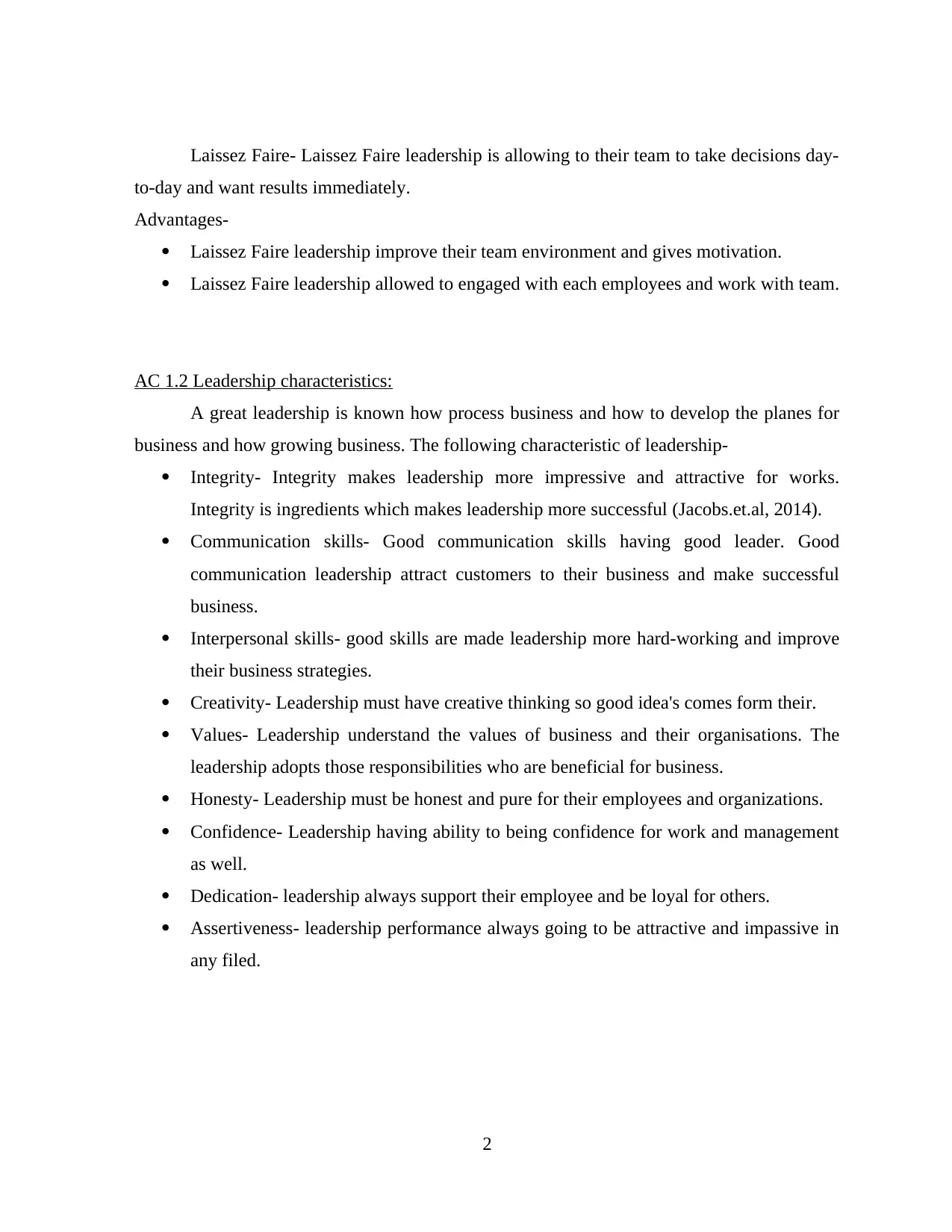
Laissez Faire- Laissez Faire leadership is allowing to their team to take decisions day-
to-day and want results immediately.
Advantages-
Laissez Faire leadership improve their team environment and gives motivation.
Laissez Faire leadership allowed to engaged with each employees and work with team.
AC 1.2 Leadership characteristics:
A great leadership is known how process business and how to develop the planes for
business and how growing business. The following characteristic of leadership-
Integrity- Integrity makes leadership more impressive and attractive for works.
Integrity is ingredients which makes leadership more successful (Jacobs.et.al, 2014).
Communication skills- Good communication skills having good leader. Good
communication leadership attract customers to their business and make successful
business.
Interpersonal skills- good skills are made leadership more hard-working and improve
their business strategies.
Creativity- Leadership must have creative thinking so good idea's comes form their.
Values- Leadership understand the values of business and their organisations. The
leadership adopts those responsibilities who are beneficial for business.
Honesty- Leadership must be honest and pure for their employees and organizations.
Confidence- Leadership having ability to being confidence for work and management
as well.
Dedication- leadership always support their employee and be loyal for others.
Assertiveness- leadership performance always going to be attractive and impassive in
any filed.
2
to-day and want results immediately.
Advantages-
Laissez Faire leadership improve their team environment and gives motivation.
Laissez Faire leadership allowed to engaged with each employees and work with team.
AC 1.2 Leadership characteristics:
A great leadership is known how process business and how to develop the planes for
business and how growing business. The following characteristic of leadership-
Integrity- Integrity makes leadership more impressive and attractive for works.
Integrity is ingredients which makes leadership more successful (Jacobs.et.al, 2014).
Communication skills- Good communication skills having good leader. Good
communication leadership attract customers to their business and make successful
business.
Interpersonal skills- good skills are made leadership more hard-working and improve
their business strategies.
Creativity- Leadership must have creative thinking so good idea's comes form their.
Values- Leadership understand the values of business and their organisations. The
leadership adopts those responsibilities who are beneficial for business.
Honesty- Leadership must be honest and pure for their employees and organizations.
Confidence- Leadership having ability to being confidence for work and management
as well.
Dedication- leadership always support their employee and be loyal for others.
Assertiveness- leadership performance always going to be attractive and impassive in
any filed.
2
Paraphrase This Document
Need a fresh take? Get an instant paraphrase of this document with our AI Paraphraser
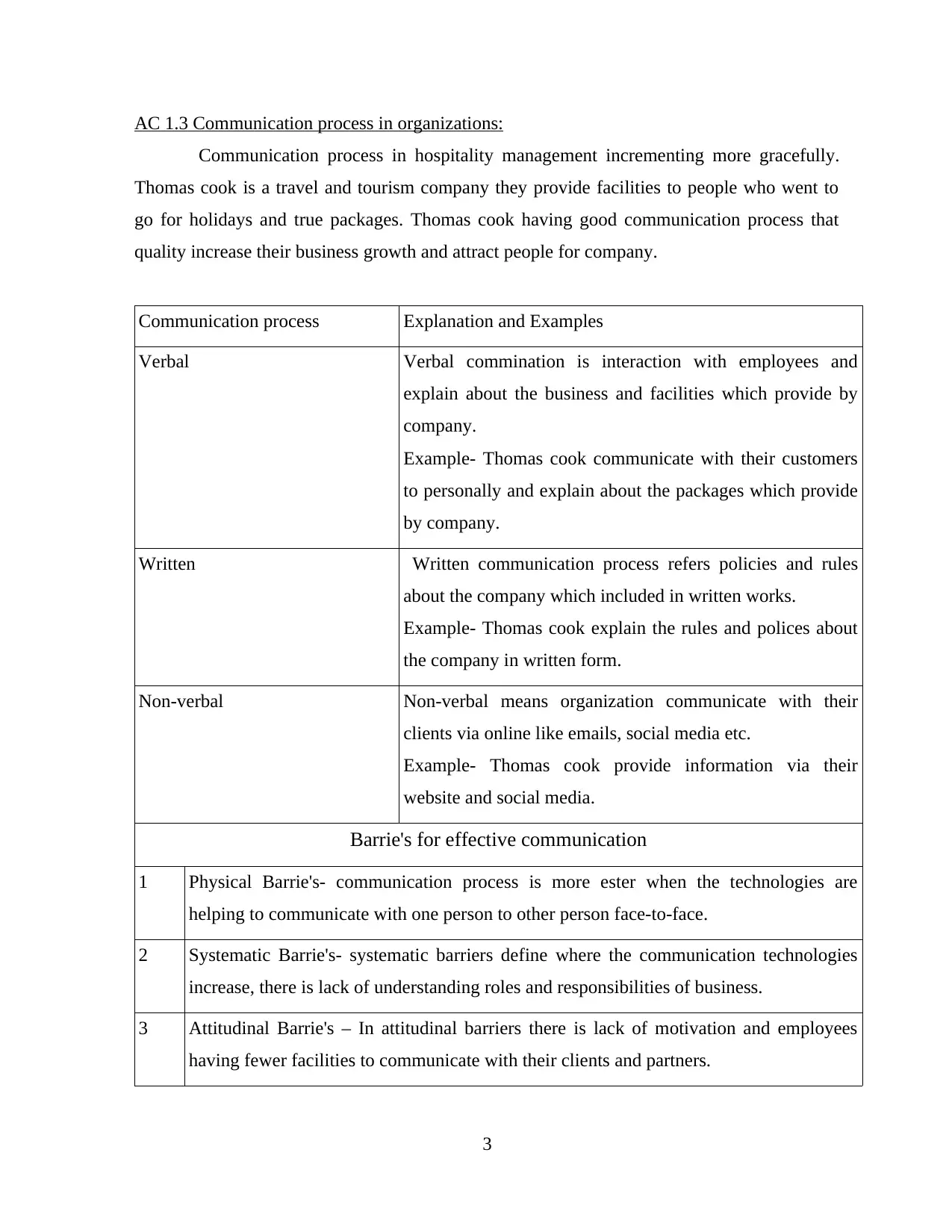
AC 1.3 Communication process in organizations:
Communication process in hospitality management incrementing more gracefully.
Thomas cook is a travel and tourism company they provide facilities to people who went to
go for holidays and true packages. Thomas cook having good communication process that
quality increase their business growth and attract people for company.
Communication process Explanation and Examples
Verbal Verbal commination is interaction with employees and
explain about the business and facilities which provide by
company.
Example- Thomas cook communicate with their customers
to personally and explain about the packages which provide
by company.
Written Written communication process refers policies and rules
about the company which included in written works.
Example- Thomas cook explain the rules and polices about
the company in written form.
Non-verbal Non-verbal means organization communicate with their
clients via online like emails, social media etc.
Example- Thomas cook provide information via their
website and social media.
Barrie's for effective communication
1 Physical Barrie's- communication process is more ester when the technologies are
helping to communicate with one person to other person face-to-face.
2 Systematic Barrie's- systematic barriers define where the communication technologies
increase, there is lack of understanding roles and responsibilities of business.
3 Attitudinal Barrie's – In attitudinal barriers there is lack of motivation and employees
having fewer facilities to communicate with their clients and partners.
3
Communication process in hospitality management incrementing more gracefully.
Thomas cook is a travel and tourism company they provide facilities to people who went to
go for holidays and true packages. Thomas cook having good communication process that
quality increase their business growth and attract people for company.
Communication process Explanation and Examples
Verbal Verbal commination is interaction with employees and
explain about the business and facilities which provide by
company.
Example- Thomas cook communicate with their customers
to personally and explain about the packages which provide
by company.
Written Written communication process refers policies and rules
about the company which included in written works.
Example- Thomas cook explain the rules and polices about
the company in written form.
Non-verbal Non-verbal means organization communicate with their
clients via online like emails, social media etc.
Example- Thomas cook provide information via their
website and social media.
Barrie's for effective communication
1 Physical Barrie's- communication process is more ester when the technologies are
helping to communicate with one person to other person face-to-face.
2 Systematic Barrie's- systematic barriers define where the communication technologies
increase, there is lack of understanding roles and responsibilities of business.
3 Attitudinal Barrie's – In attitudinal barriers there is lack of motivation and employees
having fewer facilities to communicate with their clients and partners.
3
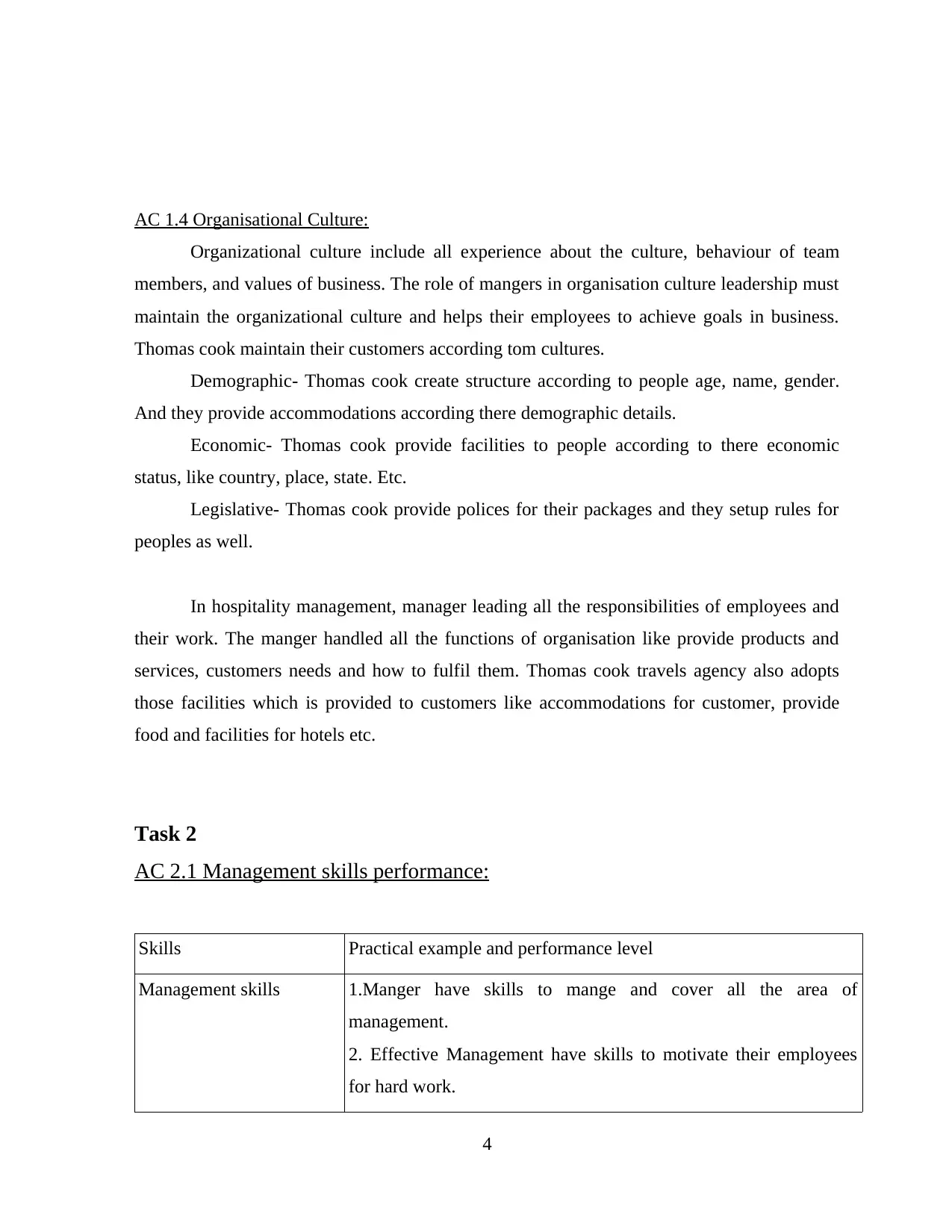
AC 1.4 Organisational Culture:
Organizational culture include all experience about the culture, behaviour of team
members, and values of business. The role of mangers in organisation culture leadership must
maintain the organizational culture and helps their employees to achieve goals in business.
Thomas cook maintain their customers according tom cultures.
Demographic- Thomas cook create structure according to people age, name, gender.
And they provide accommodations according there demographic details.
Economic- Thomas cook provide facilities to people according to there economic
status, like country, place, state. Etc.
Legislative- Thomas cook provide polices for their packages and they setup rules for
peoples as well.
In hospitality management, manager leading all the responsibilities of employees and
their work. The manger handled all the functions of organisation like provide products and
services, customers needs and how to fulfil them. Thomas cook travels agency also adopts
those facilities which is provided to customers like accommodations for customer, provide
food and facilities for hotels etc.
Task 2
AC 2.1 Management skills performance:
Skills Practical example and performance level
Management skills 1.Manger have skills to mange and cover all the area of
management.
2. Effective Management have skills to motivate their employees
for hard work.
4
Organizational culture include all experience about the culture, behaviour of team
members, and values of business. The role of mangers in organisation culture leadership must
maintain the organizational culture and helps their employees to achieve goals in business.
Thomas cook maintain their customers according tom cultures.
Demographic- Thomas cook create structure according to people age, name, gender.
And they provide accommodations according there demographic details.
Economic- Thomas cook provide facilities to people according to there economic
status, like country, place, state. Etc.
Legislative- Thomas cook provide polices for their packages and they setup rules for
peoples as well.
In hospitality management, manager leading all the responsibilities of employees and
their work. The manger handled all the functions of organisation like provide products and
services, customers needs and how to fulfil them. Thomas cook travels agency also adopts
those facilities which is provided to customers like accommodations for customer, provide
food and facilities for hotels etc.
Task 2
AC 2.1 Management skills performance:
Skills Practical example and performance level
Management skills 1.Manger have skills to mange and cover all the area of
management.
2. Effective Management have skills to motivate their employees
for hard work.
4
⊘ This is a preview!⊘
Do you want full access?
Subscribe today to unlock all pages.

Trusted by 1+ million students worldwide
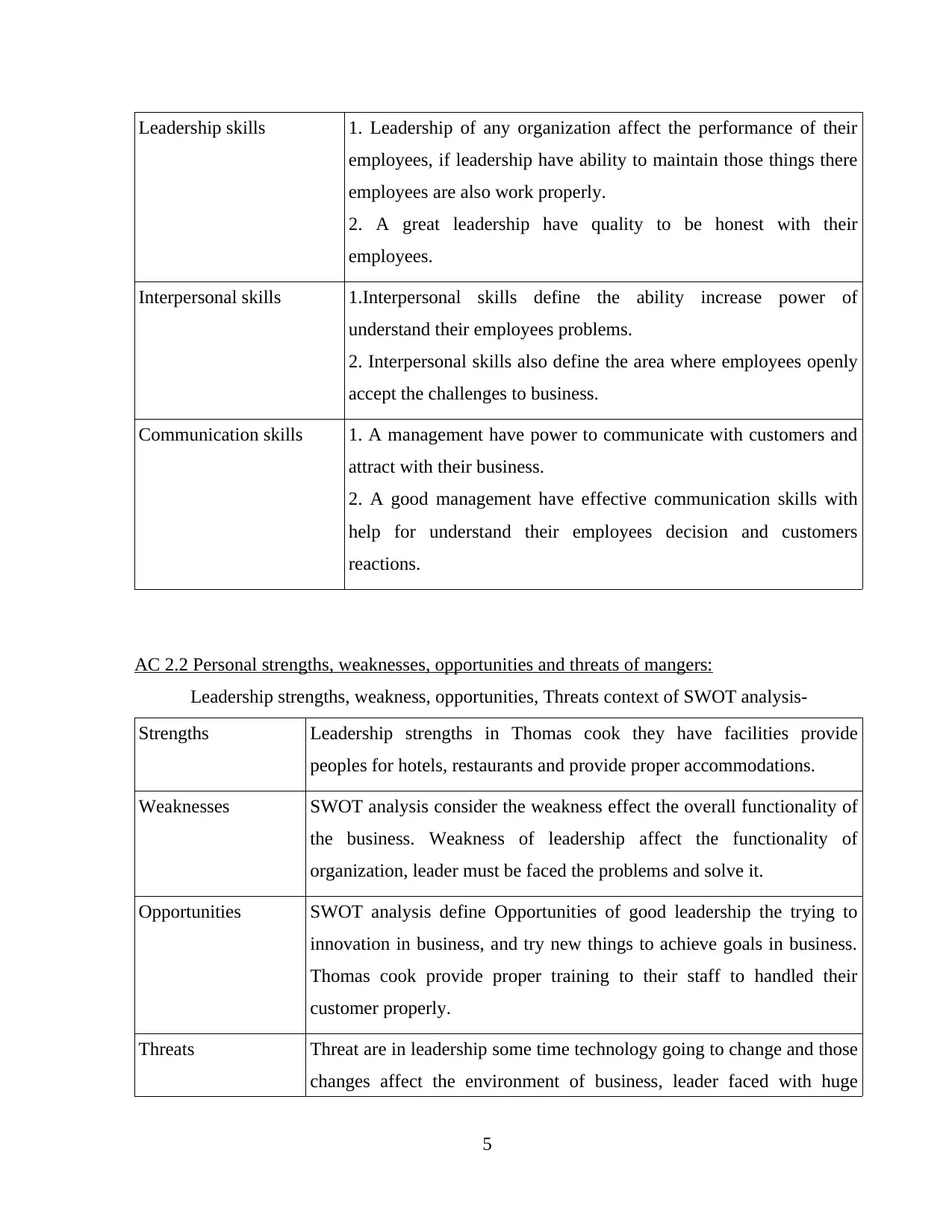
Leadership skills 1. Leadership of any organization affect the performance of their
employees, if leadership have ability to maintain those things there
employees are also work properly.
2. A great leadership have quality to be honest with their
employees.
Interpersonal skills 1.Interpersonal skills define the ability increase power of
understand their employees problems.
2. Interpersonal skills also define the area where employees openly
accept the challenges to business.
Communication skills 1. A management have power to communicate with customers and
attract with their business.
2. A good management have effective communication skills with
help for understand their employees decision and customers
reactions.
AC 2.2 Personal strengths, weaknesses, opportunities and threats of mangers:
Leadership strengths, weakness, opportunities, Threats context of SWOT analysis-
Strengths Leadership strengths in Thomas cook they have facilities provide
peoples for hotels, restaurants and provide proper accommodations.
Weaknesses SWOT analysis consider the weakness effect the overall functionality of
the business. Weakness of leadership affect the functionality of
organization, leader must be faced the problems and solve it.
Opportunities SWOT analysis define Opportunities of good leadership the trying to
innovation in business, and try new things to achieve goals in business.
Thomas cook provide proper training to their staff to handled their
customer properly.
Threats Threat are in leadership some time technology going to change and those
changes affect the environment of business, leader faced with huge
5
employees, if leadership have ability to maintain those things there
employees are also work properly.
2. A great leadership have quality to be honest with their
employees.
Interpersonal skills 1.Interpersonal skills define the ability increase power of
understand their employees problems.
2. Interpersonal skills also define the area where employees openly
accept the challenges to business.
Communication skills 1. A management have power to communicate with customers and
attract with their business.
2. A good management have effective communication skills with
help for understand their employees decision and customers
reactions.
AC 2.2 Personal strengths, weaknesses, opportunities and threats of mangers:
Leadership strengths, weakness, opportunities, Threats context of SWOT analysis-
Strengths Leadership strengths in Thomas cook they have facilities provide
peoples for hotels, restaurants and provide proper accommodations.
Weaknesses SWOT analysis consider the weakness effect the overall functionality of
the business. Weakness of leadership affect the functionality of
organization, leader must be faced the problems and solve it.
Opportunities SWOT analysis define Opportunities of good leadership the trying to
innovation in business, and try new things to achieve goals in business.
Thomas cook provide proper training to their staff to handled their
customer properly.
Threats Threat are in leadership some time technology going to change and those
changes affect the environment of business, leader faced with huge
5
Paraphrase This Document
Need a fresh take? Get an instant paraphrase of this document with our AI Paraphraser
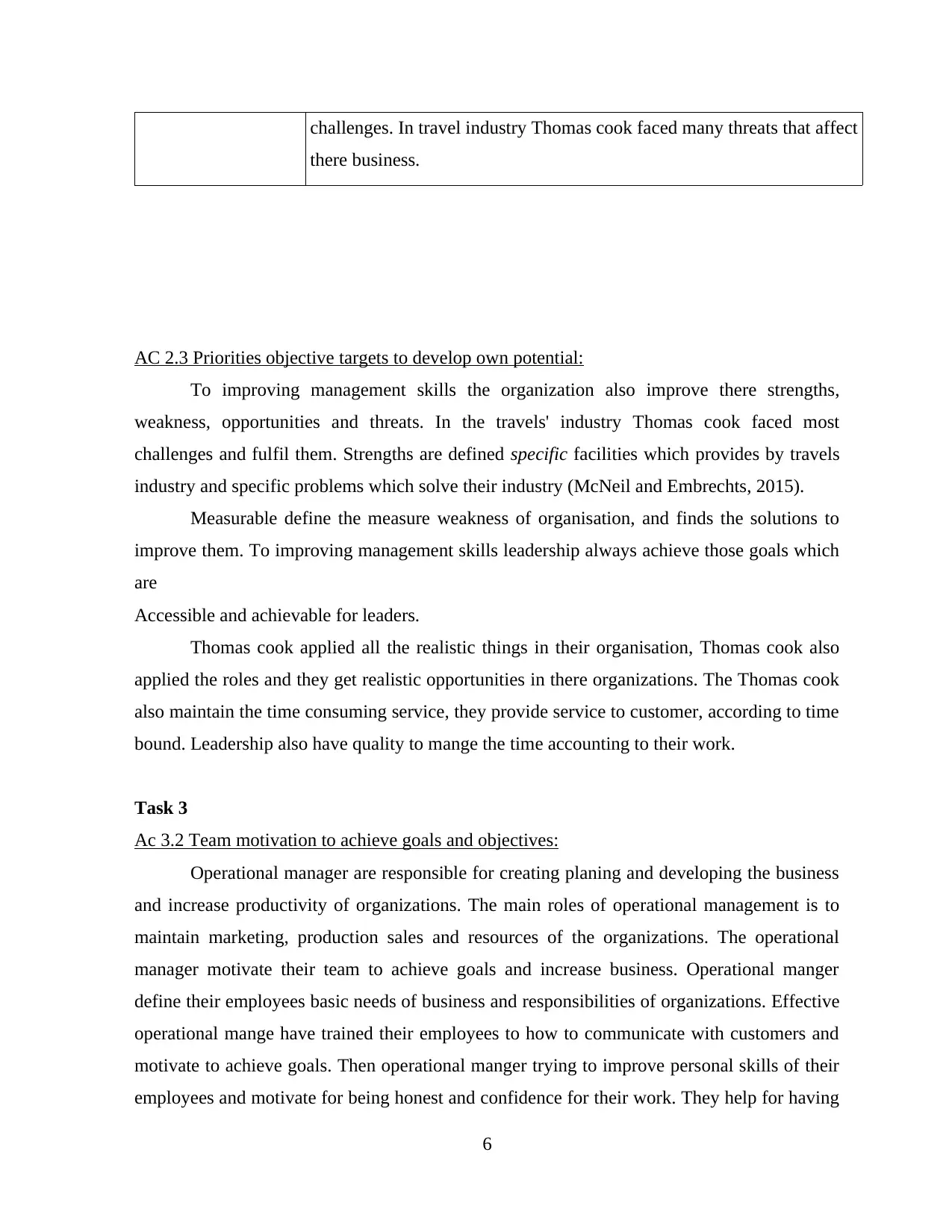
challenges. In travel industry Thomas cook faced many threats that affect
there business.
AC 2.3 Priorities objective targets to develop own potential:
To improving management skills the organization also improve there strengths,
weakness, opportunities and threats. In the travels' industry Thomas cook faced most
challenges and fulfil them. Strengths are defined specific facilities which provides by travels
industry and specific problems which solve their industry (McNeil and Embrechts, 2015).
Measurable define the measure weakness of organisation, and finds the solutions to
improve them. To improving management skills leadership always achieve those goals which
are
Accessible and achievable for leaders.
Thomas cook applied all the realistic things in their organisation, Thomas cook also
applied the roles and they get realistic opportunities in there organizations. The Thomas cook
also maintain the time consuming service, they provide service to customer, according to time
bound. Leadership also have quality to mange the time accounting to their work.
Task 3
Ac 3.2 Team motivation to achieve goals and objectives:
Operational manager are responsible for creating planing and developing the business
and increase productivity of organizations. The main roles of operational management is to
maintain marketing, production sales and resources of the organizations. The operational
manager motivate their team to achieve goals and increase business. Operational manger
define their employees basic needs of business and responsibilities of organizations. Effective
operational mange have trained their employees to how to communicate with customers and
motivate to achieve goals. Then operational manger trying to improve personal skills of their
employees and motivate for being honest and confidence for their work. They help for having
6
there business.
AC 2.3 Priorities objective targets to develop own potential:
To improving management skills the organization also improve there strengths,
weakness, opportunities and threats. In the travels' industry Thomas cook faced most
challenges and fulfil them. Strengths are defined specific facilities which provides by travels
industry and specific problems which solve their industry (McNeil and Embrechts, 2015).
Measurable define the measure weakness of organisation, and finds the solutions to
improve them. To improving management skills leadership always achieve those goals which
are
Accessible and achievable for leaders.
Thomas cook applied all the realistic things in their organisation, Thomas cook also
applied the roles and they get realistic opportunities in there organizations. The Thomas cook
also maintain the time consuming service, they provide service to customer, according to time
bound. Leadership also have quality to mange the time accounting to their work.
Task 3
Ac 3.2 Team motivation to achieve goals and objectives:
Operational manager are responsible for creating planing and developing the business
and increase productivity of organizations. The main roles of operational management is to
maintain marketing, production sales and resources of the organizations. The operational
manager motivate their team to achieve goals and increase business. Operational manger
define their employees basic needs of business and responsibilities of organizations. Effective
operational mange have trained their employees to how to communicate with customers and
motivate to achieve goals. Then operational manger trying to improve personal skills of their
employees and motivate for being honest and confidence for their work. They help for having
6
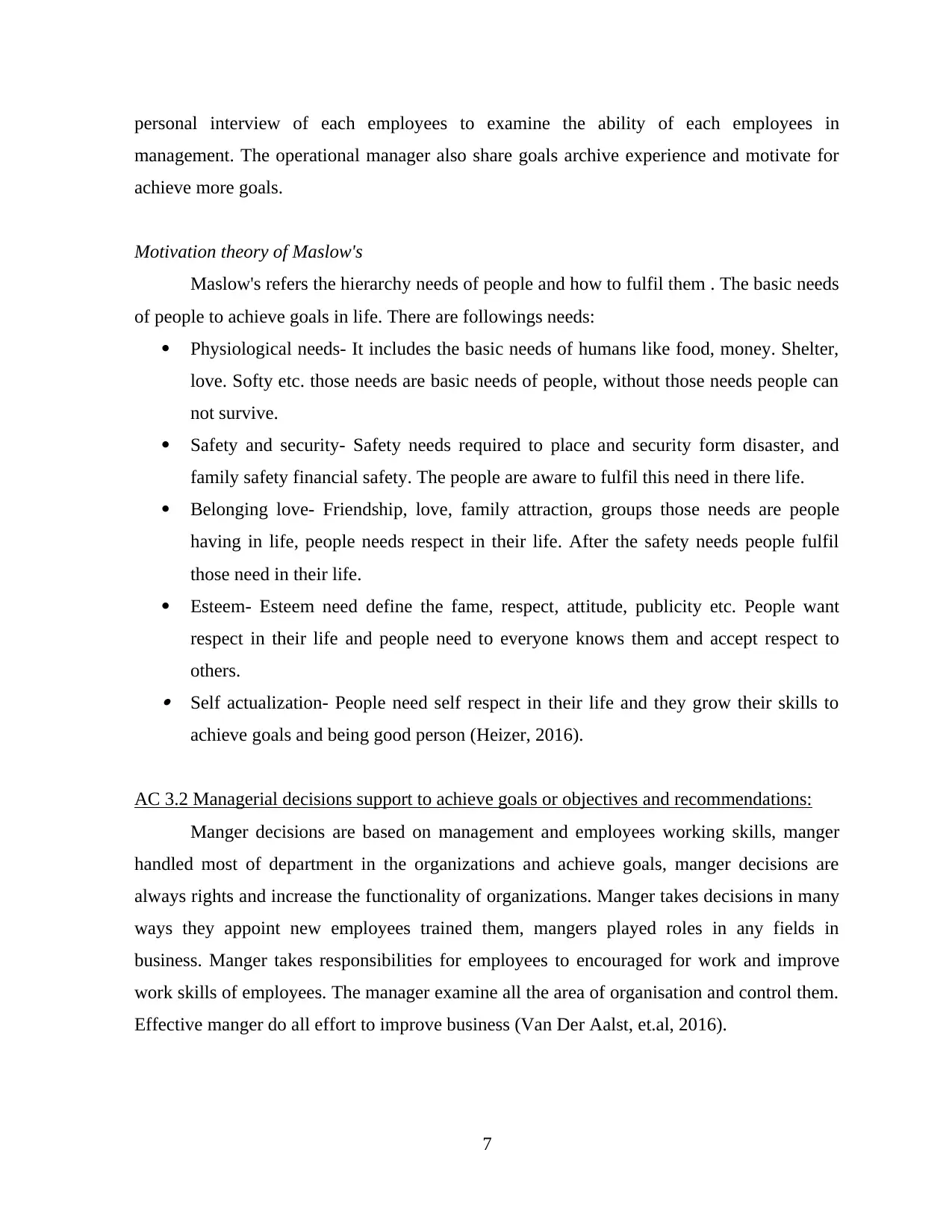
personal interview of each employees to examine the ability of each employees in
management. The operational manager also share goals archive experience and motivate for
achieve more goals.
Motivation theory of Maslow's
Maslow's refers the hierarchy needs of people and how to fulfil them . The basic needs
of people to achieve goals in life. There are followings needs:
Physiological needs- It includes the basic needs of humans like food, money. Shelter,
love. Softy etc. those needs are basic needs of people, without those needs people can
not survive.
Safety and security- Safety needs required to place and security form disaster, and
family safety financial safety. The people are aware to fulfil this need in there life.
Belonging love- Friendship, love, family attraction, groups those needs are people
having in life, people needs respect in their life. After the safety needs people fulfil
those need in their life.
Esteem- Esteem need define the fame, respect, attitude, publicity etc. People want
respect in their life and people need to everyone knows them and accept respect to
others.
Self actualization- People need self respect in their life and they grow their skills to
achieve goals and being good person (Heizer, 2016).
AC 3.2 Managerial decisions support to achieve goals or objectives and recommendations:
Manger decisions are based on management and employees working skills, manger
handled most of department in the organizations and achieve goals, manger decisions are
always rights and increase the functionality of organizations. Manger takes decisions in many
ways they appoint new employees trained them, mangers played roles in any fields in
business. Manger takes responsibilities for employees to encouraged for work and improve
work skills of employees. The manager examine all the area of organisation and control them.
Effective manger do all effort to improve business (Van Der Aalst, et.al, 2016).
7
management. The operational manager also share goals archive experience and motivate for
achieve more goals.
Motivation theory of Maslow's
Maslow's refers the hierarchy needs of people and how to fulfil them . The basic needs
of people to achieve goals in life. There are followings needs:
Physiological needs- It includes the basic needs of humans like food, money. Shelter,
love. Softy etc. those needs are basic needs of people, without those needs people can
not survive.
Safety and security- Safety needs required to place and security form disaster, and
family safety financial safety. The people are aware to fulfil this need in there life.
Belonging love- Friendship, love, family attraction, groups those needs are people
having in life, people needs respect in their life. After the safety needs people fulfil
those need in their life.
Esteem- Esteem need define the fame, respect, attitude, publicity etc. People want
respect in their life and people need to everyone knows them and accept respect to
others.
Self actualization- People need self respect in their life and they grow their skills to
achieve goals and being good person (Heizer, 2016).
AC 3.2 Managerial decisions support to achieve goals or objectives and recommendations:
Manger decisions are based on management and employees working skills, manger
handled most of department in the organizations and achieve goals, manger decisions are
always rights and increase the functionality of organizations. Manger takes decisions in many
ways they appoint new employees trained them, mangers played roles in any fields in
business. Manger takes responsibilities for employees to encouraged for work and improve
work skills of employees. The manager examine all the area of organisation and control them.
Effective manger do all effort to improve business (Van Der Aalst, et.al, 2016).
7
⊘ This is a preview!⊘
Do you want full access?
Subscribe today to unlock all pages.

Trusted by 1+ million students worldwide
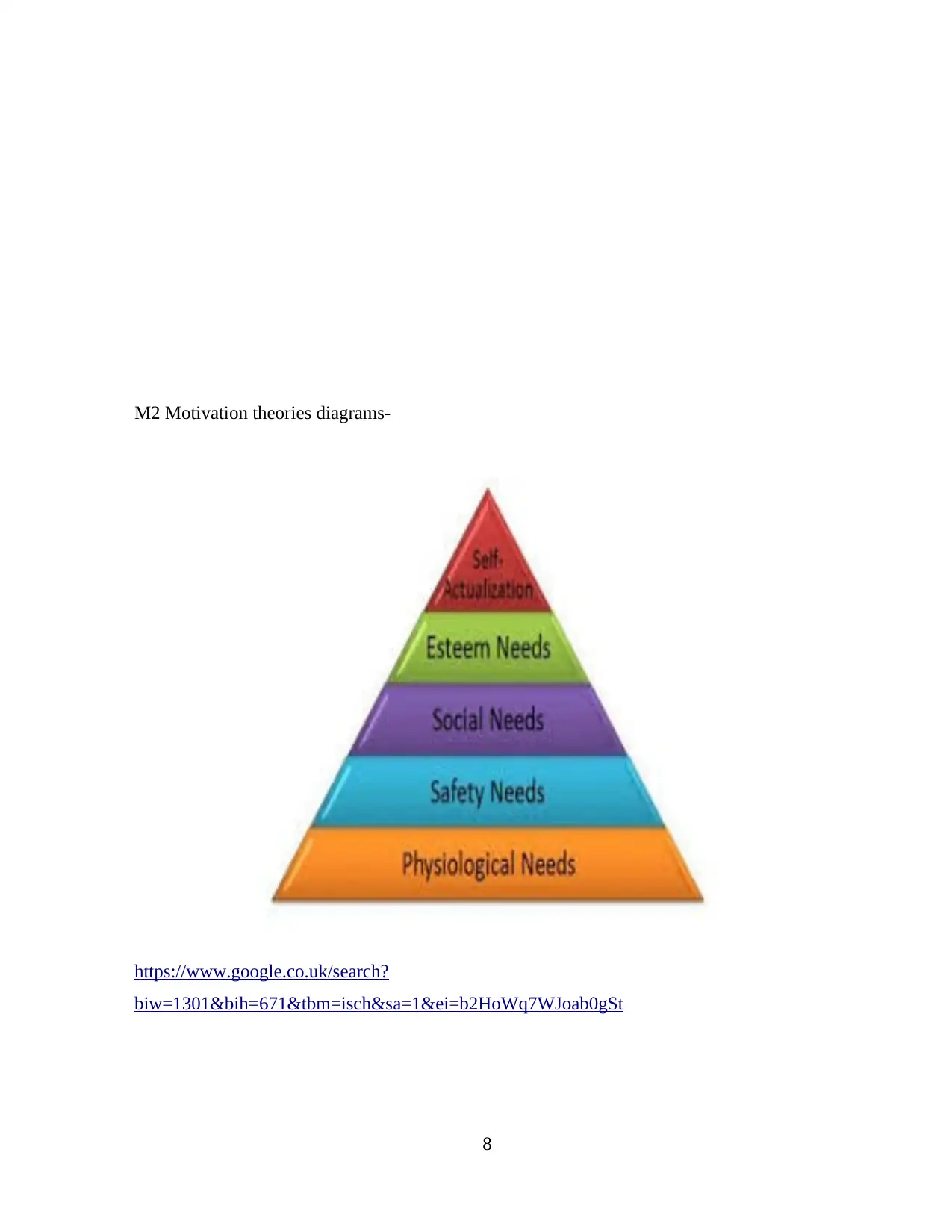
M2 Motivation theories diagrams-
https://www.google.co.uk/search?
biw=1301&bih=671&tbm=isch&sa=1&ei=b2HoWq7WJoab0gSt
8
https://www.google.co.uk/search?
biw=1301&bih=671&tbm=isch&sa=1&ei=b2HoWq7WJoab0gSt
8
Paraphrase This Document
Need a fresh take? Get an instant paraphrase of this document with our AI Paraphraser
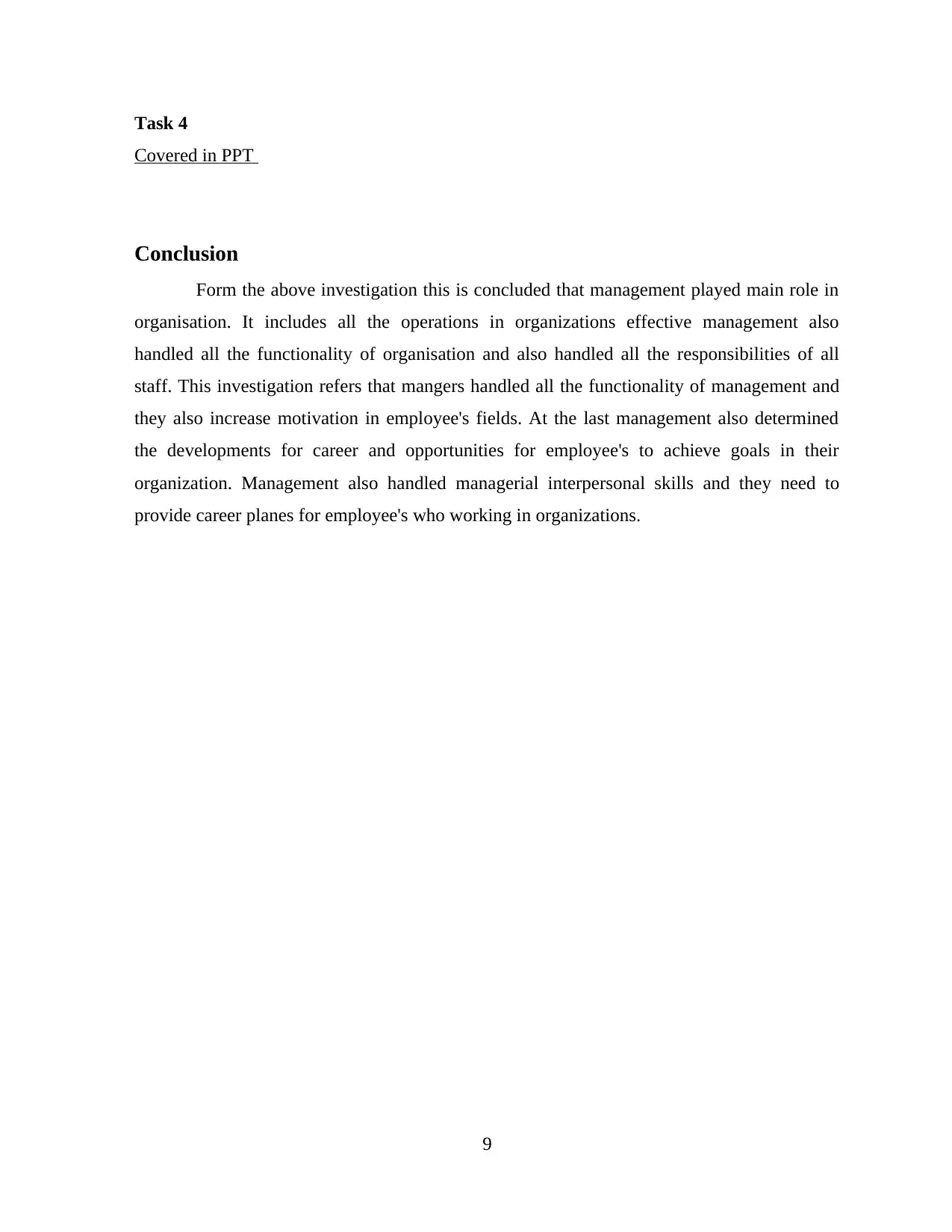
Task 4
Covered in PPT
Conclusion
Form the above investigation this is concluded that management played main role in
organisation. It includes all the operations in organizations effective management also
handled all the functionality of organisation and also handled all the responsibilities of all
staff. This investigation refers that mangers handled all the functionality of management and
they also increase motivation in employee's fields. At the last management also determined
the developments for career and opportunities for employee's to achieve goals in their
organization. Management also handled managerial interpersonal skills and they need to
provide career planes for employee's who working in organizations.
9
Covered in PPT
Conclusion
Form the above investigation this is concluded that management played main role in
organisation. It includes all the operations in organizations effective management also
handled all the functionality of organisation and also handled all the responsibilities of all
staff. This investigation refers that mangers handled all the functionality of management and
they also increase motivation in employee's fields. At the last management also determined
the developments for career and opportunities for employee's to achieve goals in their
organization. Management also handled managerial interpersonal skills and they need to
provide career planes for employee's who working in organizations.
9
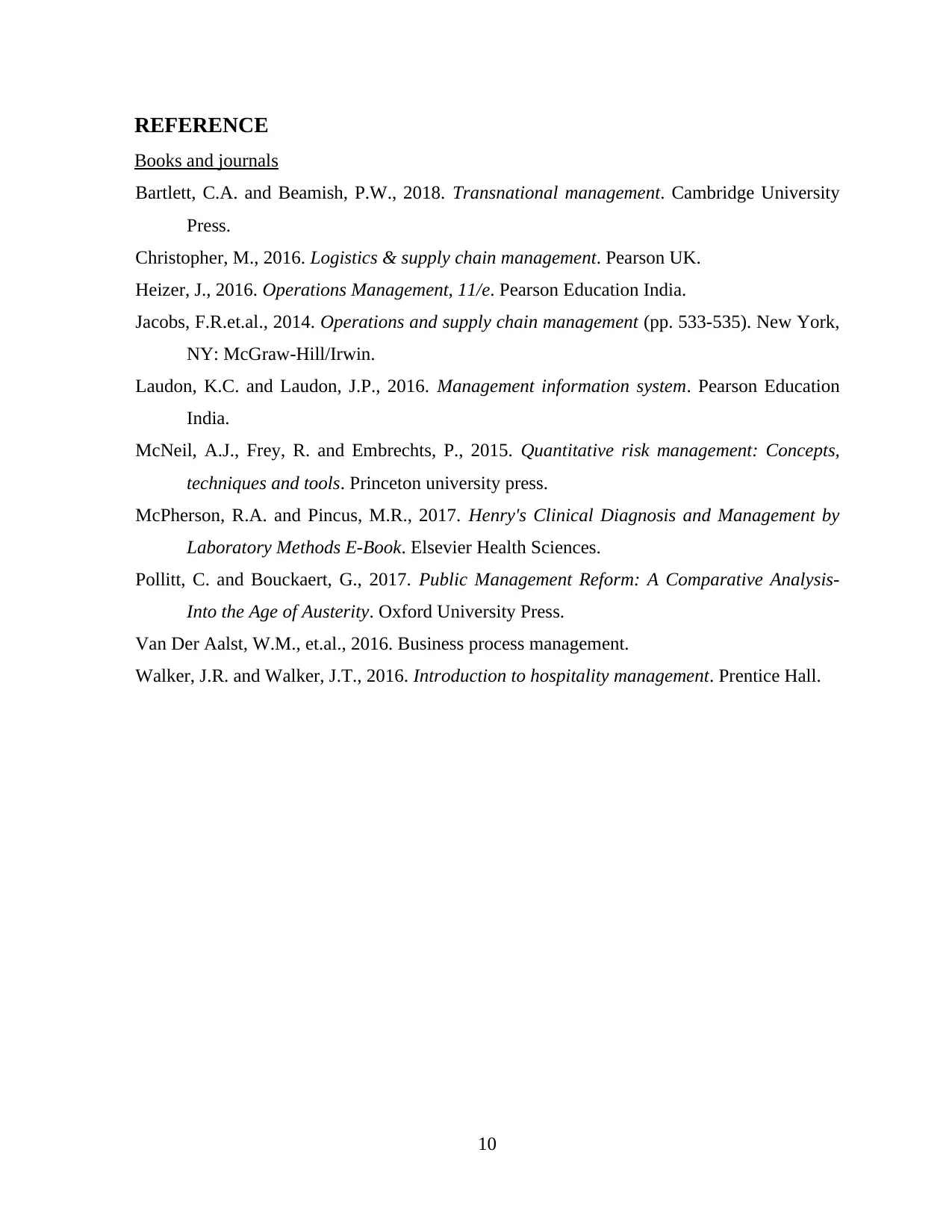
REFERENCE
Books and journals
Bartlett, C.A. and Beamish, P.W., 2018. Transnational management. Cambridge University
Press.
Christopher, M., 2016. Logistics & supply chain management. Pearson UK.
Heizer, J., 2016. Operations Management, 11/e. Pearson Education India.
Jacobs, F.R.et.al., 2014. Operations and supply chain management (pp. 533-535). New York,
NY: McGraw-Hill/Irwin.
Laudon, K.C. and Laudon, J.P., 2016. Management information system. Pearson Education
India.
McNeil, A.J., Frey, R. and Embrechts, P., 2015. Quantitative risk management: Concepts,
techniques and tools. Princeton university press.
McPherson, R.A. and Pincus, M.R., 2017. Henry's Clinical Diagnosis and Management by
Laboratory Methods E-Book. Elsevier Health Sciences.
Pollitt, C. and Bouckaert, G., 2017. Public Management Reform: A Comparative Analysis-
Into the Age of Austerity. Oxford University Press.
Van Der Aalst, W.M., et.al., 2016. Business process management.
Walker, J.R. and Walker, J.T., 2016. Introduction to hospitality management. Prentice Hall.
10
Books and journals
Bartlett, C.A. and Beamish, P.W., 2018. Transnational management. Cambridge University
Press.
Christopher, M., 2016. Logistics & supply chain management. Pearson UK.
Heizer, J., 2016. Operations Management, 11/e. Pearson Education India.
Jacobs, F.R.et.al., 2014. Operations and supply chain management (pp. 533-535). New York,
NY: McGraw-Hill/Irwin.
Laudon, K.C. and Laudon, J.P., 2016. Management information system. Pearson Education
India.
McNeil, A.J., Frey, R. and Embrechts, P., 2015. Quantitative risk management: Concepts,
techniques and tools. Princeton university press.
McPherson, R.A. and Pincus, M.R., 2017. Henry's Clinical Diagnosis and Management by
Laboratory Methods E-Book. Elsevier Health Sciences.
Pollitt, C. and Bouckaert, G., 2017. Public Management Reform: A Comparative Analysis-
Into the Age of Austerity. Oxford University Press.
Van Der Aalst, W.M., et.al., 2016. Business process management.
Walker, J.R. and Walker, J.T., 2016. Introduction to hospitality management. Prentice Hall.
10
⊘ This is a preview!⊘
Do you want full access?
Subscribe today to unlock all pages.

Trusted by 1+ million students worldwide
1 out of 12
Related Documents
Your All-in-One AI-Powered Toolkit for Academic Success.
+13062052269
info@desklib.com
Available 24*7 on WhatsApp / Email
![[object Object]](/_next/static/media/star-bottom.7253800d.svg)
Unlock your academic potential
Copyright © 2020–2025 A2Z Services. All Rights Reserved. Developed and managed by ZUCOL.




